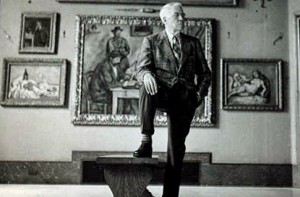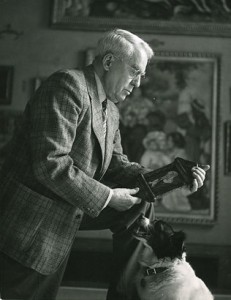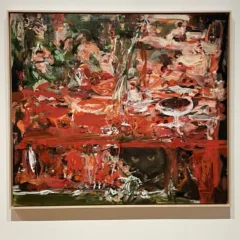Nothing says a documentary film should be impartial. But a sincere attempt to get the facts right makes some documentaries better than others. The Art of the Steal, the movie affiliated with the Friends of the Barnes, is such a completely one-sided telling of the Barnes Foundation saga that my teeth were grinding from start to finish. (I saw the movie last week at the popcorn screening at Drexel. I’m not sure where the movie’s playing at the moment, although you can now see it at Netflix. (Netflix info updated 2/15/2011)

With its high production values and heavy reliance on sarcasm to carry the argument forward, The Art of the Steal is in the Michael Moore school of movie-making. Whereas I agree with Michael Moore and I like his movies, I disagree with the Friends of the Barnes so I found their movie difficult to sit through to say the least.
The interviews are mostly with the main Friends of the Barnes, and the settings are for the most part richly-appointed living spaces, which we have to assume are the homes of the interviewees. Interspersed are film clips and photos of Albert Barnes walking his little black and white dog…in Paris, in Merion, on a cliff overlooking the ocean. Aggressive use of Philip Glass-like music throughout ratchets up the tension and enhances the movie’s one idea, that there is a vast left-wing conspiracy by a cabal of evil do-gooders to pull a fast one on the public and spirit away the multi-billion dollar collection from its home in Philadelphia’s suburbs.
Putting history under a microscope and analyzing it is something best left to trained historians. The well-meaning people who give their analysis in this movie piece together a story from their perspectives as neighbors of the Barnes, friends and former students of the Barnes and former teachers at the Barnes. What results is one passionate outpouring after another, often told with high sarcasm or deadpan irony. It’s the same story again and again — Albert Barnes wanted his foundation in Merion, his trust was broken, evil do-gooders rushed in to grab the institution for their own reasons — and personalities and politics were involved.

If there’s an evil do-gooder here it’s Richard Glanton, former head of the Barnes, who brought a racial discrimination lawsuit against Lower Merion township resulting in massive amounts of money being spent on lawyers, which depleted the Barnes treasury and was the catalyst for the actions by Pew, Annenberg, the PMA, the state of PA, Judge Ott and the city of Philadelphia.
One of the under-lying issues not dealt with — although it was a big issue initially for the Friends of the Barnes — is the anger about the breaking of this rich guy’s will. Most of us will not be rich like Albert Barnes and we won’t leave messy wills with untenable stipulations that need overturning 50 years on. But if you’re rich, you might be all exorcised about this very issue.
For most of us, the move of the Barnes to the Parkway will be a blessing. We will get to see the art! How bad will that be in the end? Barnes initially wanted his collection to be in the city of Philadelphia but when he debuted the works in the city the critics roared against the art calling it primitive and abominable, and the art intelligentsia didn’t go for it either. Barnes owned property in Merion so he put the collection there, next to his house. But Barnes didn’t put the art in Merion solely for the neighbors. He wanted ordinary people to see his art. He believed in art as a tool to elevate the masses; an educational tool to grow a better democracy. Mr. Art as Experience, John Dewey, a philosopher who believed in art as education, was his friend. The move of the Barnes to the Parkway will allow Albert Barnes’ educational goal finally to go forward.
That it took some political muscle to make the Barnes Foundation solvent and viable for the future, well that’s just the way of the world. Ask historians how the Social Security Act got passed; or Medicare; or our new healthcare reform bill. It will be the same story. Politics happens. The issue is, what’s the outcome? The outcome of the Barnes Foundation moving to Philadelphia will be that more ordinary people will be able to see the art. Who’s harmed here?
More about the Barnes at their FAQ page.








